Erin Gruwell on the Importance of Storytelling in Education

Erin Gruwell spent a day on 91 ”∆µ's campus to to learn more about the School of Education, meet with 91 ”∆µ in the Education program and tour the Sara and Sam Schoffer Holocaust Resource Center on Wednesday, April 24.
Galloway, N.J. ‚Äì Almost 20 years ago, ‚Äî a then-brand-new teacher assigned to a high-risk English class at a southern California high school ‚Äî picked up a roll of electrical tape and told her 91 ”∆µ to form two separate groups.
She rolled out a line of green tape and told her 91 ”∆µ that they would play a game rather than continue their lesson. The game started with her asking them questions, and the 91 ”∆µ answered by either standing on the line in affirmation or staying where they were in rejection.
The rowdy 91 ”∆µ laughed when asked about buying Snoop Dogg‚Äôs album or seeing the movie ‚ÄúBoyz in the Hood,‚Äù but they grew quiet when the questions and statements hit closer to home.
“How many of you know where to get drugs right now?”
“How many of you know someone in a gang?”
“Stand on the line if you’ve lost a friend to gang violence. How about two? More than three?”
As the 91 ”∆µ exchanged looks with each other across the tape, they realized that the simple game Gruwell created revealed the barriers and challenges that they each faced in their journey to academic success. This forced them to not only be kinder to each other but also to understand what Gruwell wanted them to understand all along: their stories are more alike than different, and they all deserve to be told.
“At that moment, I realized that every one of these kids, even though they have these tough shells, I just have to try to crack them,” Gruwell said. “I have to give them the opportunity to share their stories. Yes, Shakespeare will come, but right now, I want them to be the storytellers.”
Little did the 91 ”∆µ and Gruwell know at the time that this game ‚Äî in addition to other aspects of her teaching, such as required daily journaling for self-reflection and a trip to the Museum of Tolerance ‚Äî would become the basis of a collaborative book that later became immortalized in the 2007 film ‚ÄúFreedom Writers.‚Äù
Gruwell has since founded a foundation that tries to recreate the magic that sparked her 91 ”∆µ‚Äô imaginations in classrooms across the nation through training, outreach, scholarship, and curriculum development. On Wednesday, April 24, she visited Stockton University to learn more about the School of Education, meet with 91 ”∆µ in the Education program and tour the Sara and Sam Schoffer Holocaust Resource Center.
She was particularly interested in the initiatives that the School of Education has hosted to foster more diversity in teaching and education, including 2023‚Äôs Future Teachers of Color Conference. Gruwell looks forward to supporting the next generation of teachers and educators in ‚Äúwriting what needs to be written,‚Äù as she and her 91 ”∆µ did in the 1990s.
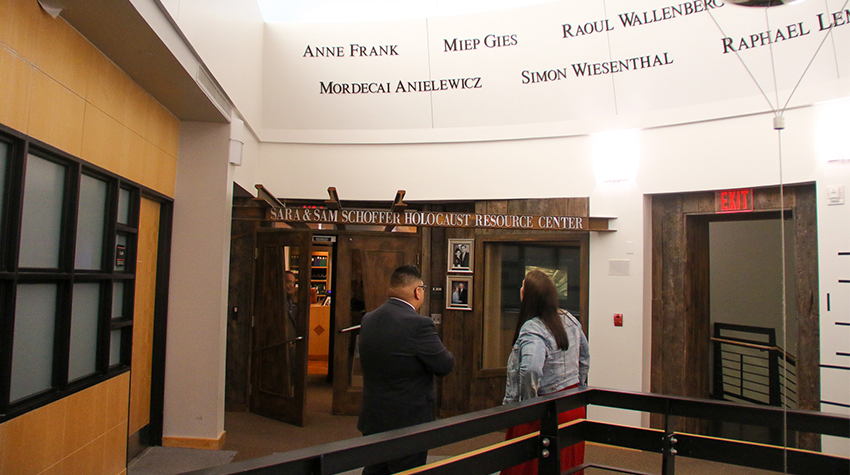


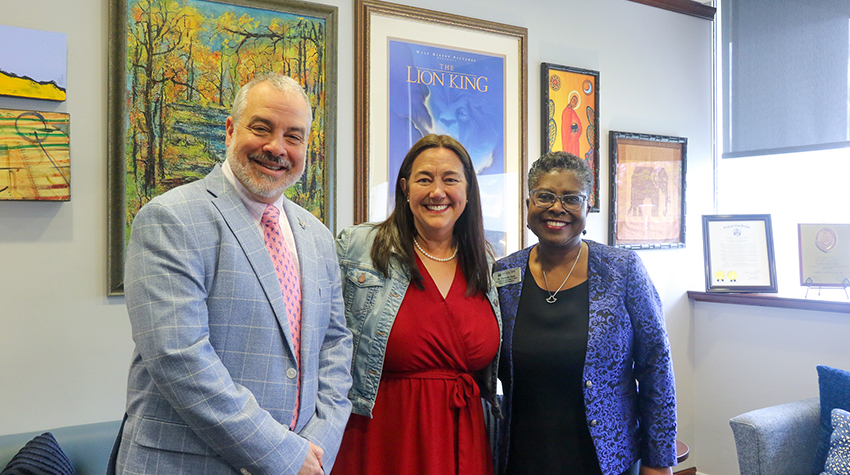
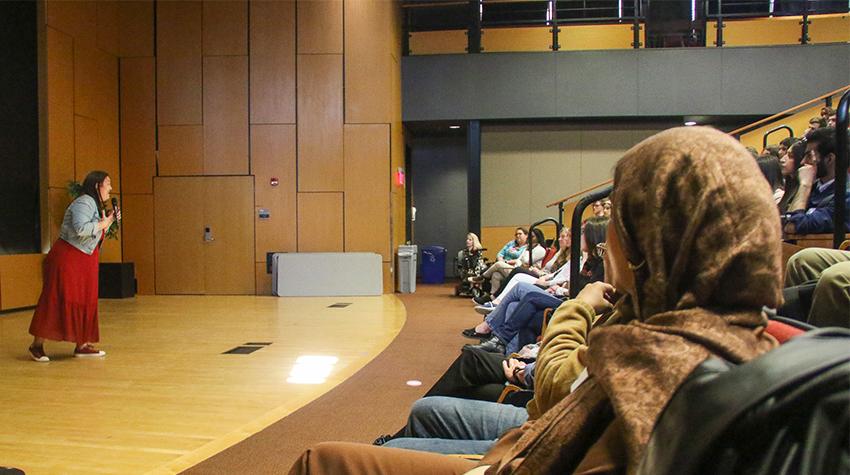
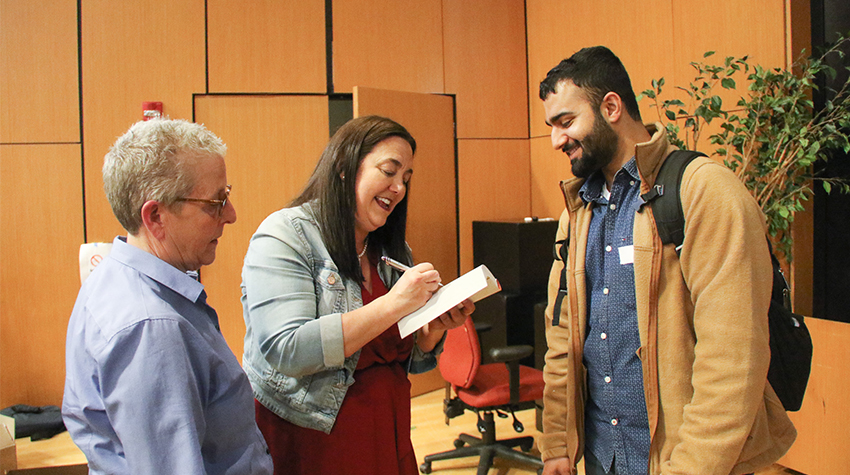
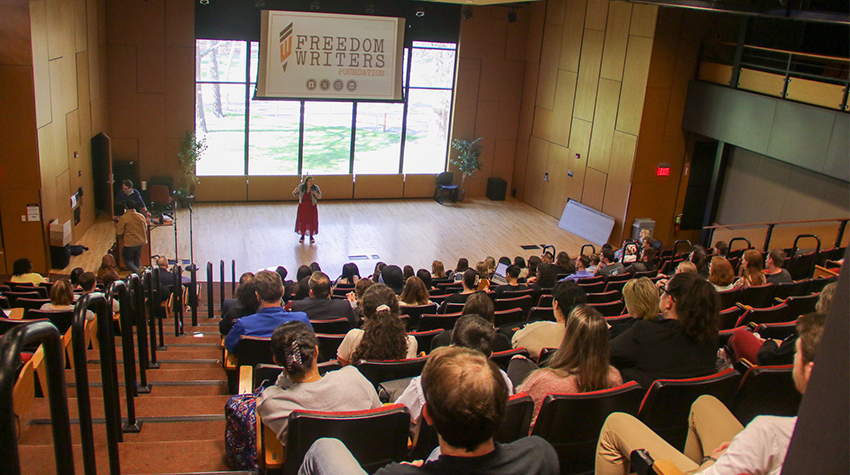
‚ÄúWe enjoyed a really intimate couple of hours with future educators, and I hope that some of the ideas that I shared about my journey don‚Äôt talk anybody out of this noble profession that I am so incredibly proud of. I‚Äôm so excited that many of the folks in this room right now want to and plan to become teachers,‚Äù Gruwell said to the audience of about 100 91 ”∆µ.
In addition to answering 91 ”∆µ' questions, Gruwell spent the presentation bringing the stories of the Freedom Writers ‚Äî who just recently celebrated their 20th anniversary with a new edition of their book, ‚ÄúThe Freedom Writers Diary‚Äù ‚Äî to life through clips from their documentary. Stockton 91 ”∆µ got to hear from the actual 91 ”∆µ whose lives were changed by a young Gruwell brandishing tape and composition notebooks.
As Carlos — “Tito” in the film — got vulnerable about how Gruwell’s lesson on the Holocaust impacted him and how he viewed his classmates, Gruwell talked about how she was able to see him transform from a houseless and troubled teenager on the constant search for food and a place to sleep to a man, mentor and leader in his community through the beginnings of her social-emotional curriculum.
Key Aspects of the Freedom Writers Social-Emotional Curriculum
- Storytelling and Journaling
- Empathy and Understanding
- Conflict Resolution
- Building Resilience
- Cultural Awareness and Tolerance
- Community Engagement
It is her hope that stories of transformation like this can continue through future educators equipping their 91 ”∆µ with the tools and resources to tell their own stories.
One of those future educators, student Therese Reidy, was moved by Gruwell’s visit.
‚ÄúWhat an experience this was for anyone not only studying Education but or Holocaust and Genocide Studies, as well. Meeting, talking, and interacting with Erin was a surreal moment and is an experience I will always think back to when I think of my time at 91 ”∆µ,‚Äù Reidy of Woodbine said.
Another student, Atlantic City native LaRissa Sykes, succinctly summarized her feelings in one sentence: “Erin has inspired me to keep fighting for my dream of being a teacher to make a difference in children's lives.”
Education Professor Meg White thanked Gruwell for taking the time to talk to her 91 ”∆µ.
‚ÄúAt my first job in higher education, I walked into the dean‚Äôs office, and she told me, ‚ÄòYour job as a teacher is to take the 91 ”∆µ from where they are and make them better,‚Äô‚Äù White said after Gruwell‚Äôs closing remarks. ‚ÄúI just want to thank you because everybody who has crossed your path today was taken from where they are and made better by you.‚Äù
Conference Emphasizes Importance of Teachers of Color
May 18, 2023

Galloway, N.J. ‚Äî A recent study found that over 50 schools in New Jersey don‚Äôt employ a single teacher of color, even though, according to the New Jersey Education Association (NJEA), 91 ”∆µ of color make up over 50% of state schools.
In response to the wide disparity, faculty members Stacey Culleny and Meg White of the School of Education created an all-day conference for high school 91 ”∆µ to promote the field of education.
The Future Teachers of Color Conference came to fruition May 17 with more than 200 local 91 ”∆µ in attendance.
White remembered seeing a student walk into one of the sessions and immediately point out one of the many multicultural posters adorning the walls. On them were various philosophers, artists and authors of color, and lessons in Math and English from different parts of the world, including India. The Indian student smiled as he told White about the poster and what he liked about it which affirmed White’s goal of centering the experiences of people of color in education for this conference.
“That’s what we’re trying to do here, right? It’s all about representation,” White said. “Like for him to come in and feel this way after seeing a poster… I almost got a little teary over that.”
The conference included breakout sessions where 91 ”∆µ learned about the significance of teacher-student relationships from two-time Stockton alumna (and current doctoral candidate for the Ed.D. program) Brenda Brathwaite of the Atlantic City School District and the power of coaching, advising and mentoring by Cynthia Sanchez-Munoz, Tim Watson and Randy Dean of Cedar Creek High School.
How Can We Help All Students to Benefit from Diversity?
By Claudine Keenan | SPRING 2023 | Celebrate Diversity Digest




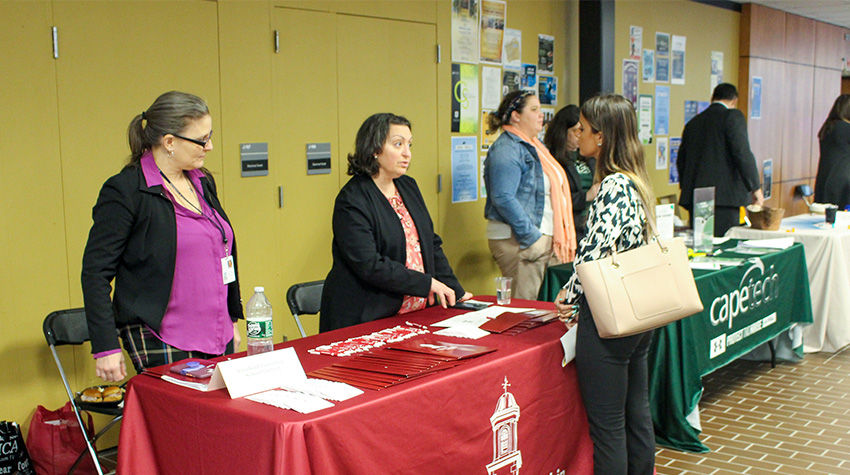

After observing the state of education both in and out of New Jersey, Claudine Keenan, dean of the School of Education, wanted to share her insights on how beneficial teacher diversity is for all 91 ”∆µ.
A strong consensus among social science researchers supports the multiple ways that . National of public school enrollments suggest that our nation‚Äôs future 91 ”∆µ will continue to benefit from more diverse classmates through 2030.
However, these increasingly diverse high school graduates are pursuing education careers at uneven rates that are not equivalent to other careers that require a bachelor’s degree.
For example, while the percentage of teachers who identify as Hispanic, Asian, and Two or More Races has increased over the most recent decade or so, the percentage of teachers who identify as Pacific Islander and American Indian/Alaska Native has remained unchanged, and both the percentage of teachers who identify as White or as Black have decreased. As a result, the imbalance between our increasingly diverse P-12 student body and their educators continues to grow.
– Story by Loukaia Taylor
– Photos by Lizzie Nealis

